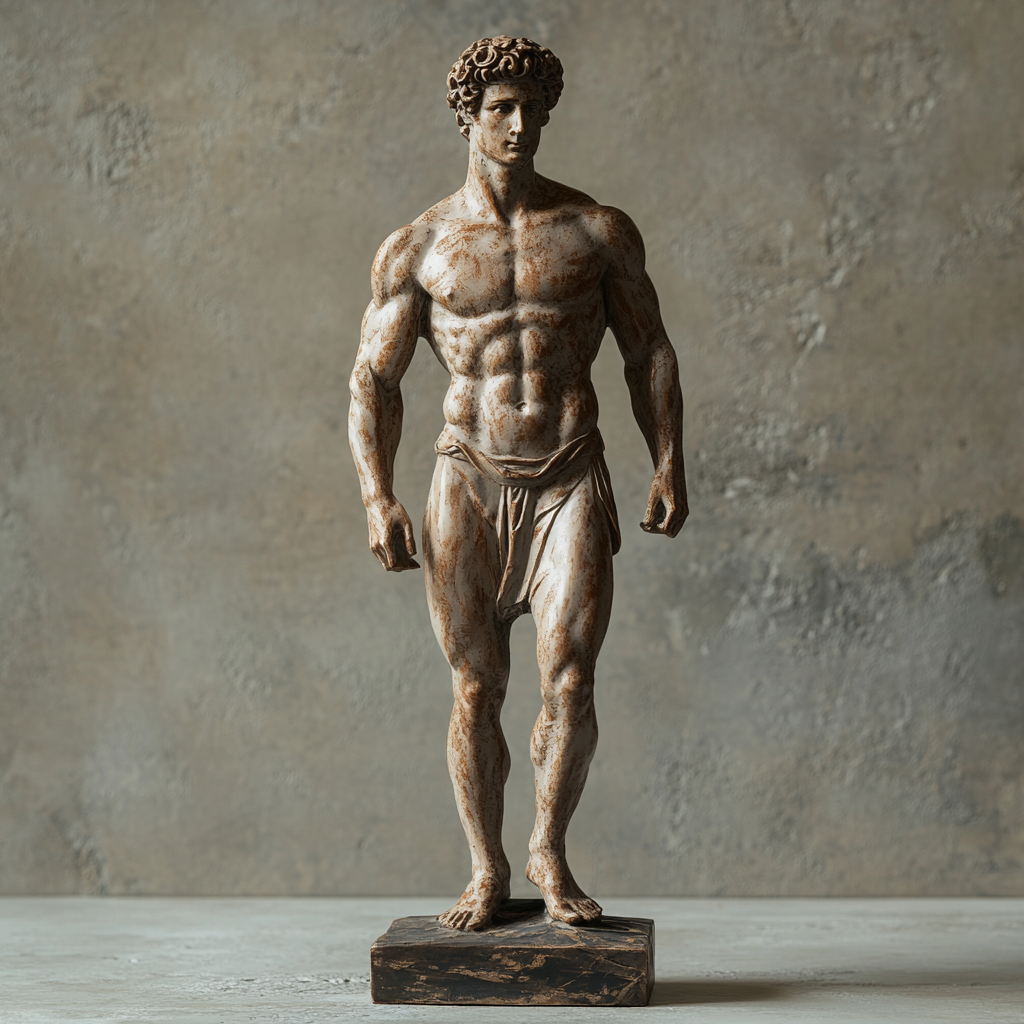Ancient Olympia stood as the most significant sanctuary in the Peloponnese, rivaling even the prestige of Delphi. Though it wasn’t a populated city, it boasted temples, religious structures, and artistic works, all dedicated to serving the Olympic Games.
According to history, Olympia was originally a sacred site dedicated to Rhea, the wife of Cronus. Over time, it evolved into a revered sanctuary in honor of Zeus, where the Olympic Games were held. Historians mark the first official Games as taking place in 776 BCE.
Winners of each Olympiad were immortalized by having their names inscribed on marble pillars alongside the date of their victory. The very first recorded Olympic victor was Koroibos of Elis, who won the stadion race—a sprint of approximately 200 meters.
Here are five legendary Olympic victors whose stories echo through the centuries:
1. Glaukos of Karystos
Glaukos earned Olympic glory in boxing, but his rise to fame is wrapped in legend. Some stories claim he descended from Glaucus, a sea deity from Boeotia.
His father, Dymilos, recognized Glaukos’ raw strength while the young boy was helping with farm work. One day, struggling to attach the plowshare to a plow without any tools, Glaukos struck it with his bare hand—so hard that it locked into place perfectly.
Stunned by his son’s strength, Dymilos believed Glaukos was destined for greatness in the boxing ring. He brought him to Olympia for the 65th Olympiad in 520 BCE, although Glaukos was underprepared and lacked refined technique.
During the match, his opponent began to dominate. That’s when Dymilos shouted from the crowd: “Boy, the plow stroke!”—referring to the moment on the farm. Glaukos mimicked the movement with all his might and knocked out his opponent.
He later triumphed in other major games like the Pythian and Isthmian Games, earning immense respect. After his death, his fellow citizens honored him by naming the island where he was buried “Glaukos’ Isle,” and, according to Pausanias, his son erected a statue of him in Olympia.
2. Dorieus of Rhodes
A powerhouse in pankration, Dorieus was from the aristocratic Eratidai family and the son of the undefeated champion Diagoras of Rhodes. He claimed three consecutive Olympic titles in pankration (432, 428, and 424 BCE).
His accolades extended beyond Olympia: eight victories at the Isthmian Games, seven at the Nemean Games, and one at the Pythian Games. An inscription in Olympia even recorded his second Olympic win during the 88th Olympiad.
But Dorieus was more than an athlete—he was a skilled military commander and naval strategist. He supported Sparta during the Peloponnesian War and was captured by the Athenians. Out of respect for his athletic legacy, they released him.
Tragically, his allegiance to Sparta led to his execution by the Spartans themselves, who viewed him as a traitor—partly because Rhodes had become an Athenian ally.
3. Theagenes of Thasos
A prodigy from Thasos, Theagenes competed in multiple disciplines, winning Olympic titles in boxing (480 BCE) and pankration (476 BCE). His immense strength earned him comparisons to Heracles.
His feats began early—at age nine, he reportedly carried a bronze statue of a god back to his home. Though considered an act of sacrilege, he avoided a death sentence and was merely ordered to return it.
One of his greatest victories was against the renowned Euthymos, a champion in both wrestling and pankration with a staggering record: three Pythian, nine Nemean, and ten Isthmian victories. After defeating him, Theagenes toured competitions across Greece, aiming to prove himself in running events as well.
According to Pausanias, he amassed an astonishing 1,400 victories throughout his career.
Back in Thasos, a statue was erected in his honor. Legend has it that after his death, a man who hated him would flog the statue every night—until one night, it fell and killed him. His sons blamed the statue for their father’s death.
At that time, Thasians followed the Draconian laws, which dictated that even inanimate objects that caused death must be punished. As a result, the statue was cast into the sea.
Years later, the island faced a devastating famine. Seeking guidance, they consulted the Oracle of Delphi, which instructed them to “bring back the exiles.” Despite doing so, the suffering continued.
Another message from the Oracle clarified: “You forgot your greatest exile—Theagenes, whose statue you threw into the sea.” Fishermen eventually recovered it in their nets, and from that moment on, the people of Thasos worshiped Theagenes as a god.
4. Kimon, son of Stesagoras
An Athenian nobleman and victor in the tethrippon (four-horse chariot race), Kimon was the father of the famed general Miltiades, who led Athens to victory at the Battle of Marathon.
According to Herodotus, Kimon won three Olympiads in a row—the 61st, 62nd, and 63rd Games. During this time, he was exiled by the tyrant Peisistratos.
While in exile, he won at the Olympics of 536 BCE. Interestingly, at the 62nd Olympiad, he dedicated his victory to Peisistratos, allowing the tyrant to claim the title of Olympic champion. This tactic earned Kimon a return to Athens.
However, after his third win, the tyrant’s sons, envious of his fame and popularity, ambushed and murdered him.
In his memory, not only was Kimon buried with honors, but his horses—responsible for his victories—were also given a burial across from his grave, a rare tribute in ancient Athens.
5. Oibotas of Dyme
A native of Dyme in Achaea, Oibotas was victorious in the stadion race during the 756 BCE Olympic Games.
Pausanias recounts that, despite being the first Achaean Olympic champion, his hometown failed to honor him. In frustration, Oibotas cursed them, declaring that no Achaean would ever win again.
As the curse seemed to hold true, the people of Dyme eventually built a statue in his honor, bearing the inscription:
“This Achaean, Oibotas son of Oinias, with his victory, brought lasting glory to his homeland, once known as Palea.”
Shortly after, an Achaean named Sostratos from Pellene won in the boys' stadion race—marking the end of the curse.
















